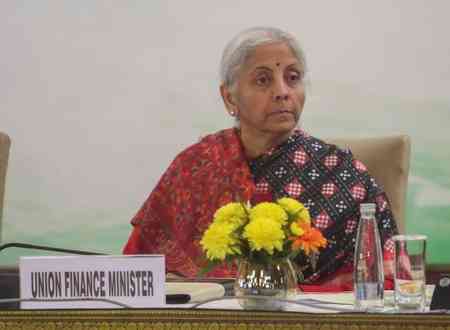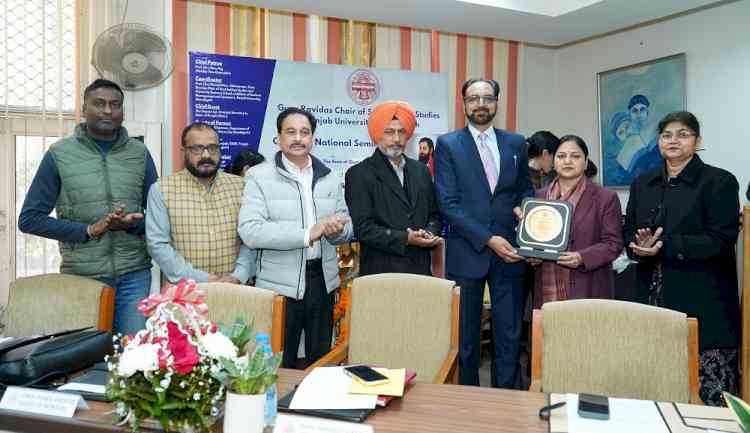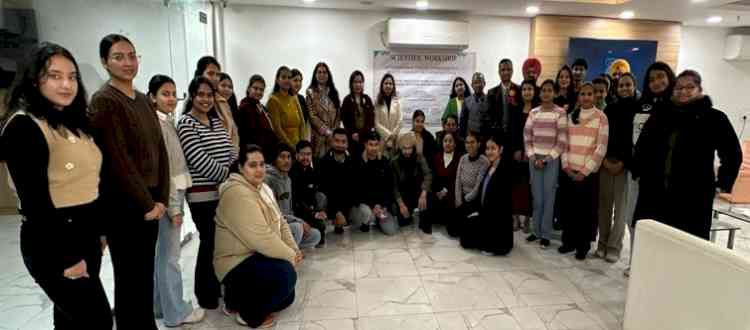Intellectual property leading tool to boost economy
2 day Webinar on Intellectual Property right organized by Science City

Kapurthala: Innovation and creative endeavors are indispensable elements that drive economic growth and sustain the competitive edge of the economy of any country. The last century recorded unprecedented improvements in health, economic well-being, and overall quality of life worldwide. Developed countries relied on intellectual property as one of the leading tools with which such advances were realized and Patents, trademarks, and copyrights were the principal means for establishing ownership rights to the creations, inventions, and brands that were used to generate tangible economic benefits. These were the views expressed by Dr. Neelima Jerath Director General Science City during webinar on intellectual property Rights jointly organized by Pushpa Gujral Science City TIFAC, Department of Science &Technology Govt. of India. More than 200 students and teachers from various Technolical colleges of Punjab were participated in this webinar. As per World Intellectual Property Indicators-2019 Report, India has emerged as the top tenth nation in the ranking of the total (resident and abroad) IP filing activity. With government push to schemes like ‘Make in India’, ‘Skill India’ and now ‘Atma-nirbhar Bharat’, IP Filing and grant activity is likely to increase, Industry 4.0 is witnessing new inventions and breakthroughs as it faces challenges in providing the right environment to stimulate innovation, especially in Artificial Intelligence and Machine Learning. IP-intensive industries have been identified as an important and integral part of a country’s economy and account for more jobs and a larger share of its GDP, sh added.
Dr.Yashawant Dev Panwar, Head of PFC-IPR said that the Government of India has taken concrete steps to establish favourable environment for creation and protection of Intellectual Property Rights and strengthening IP administration in the country. The National IPR Policy, launched in May 2016, to promote strong IP regime in the country encourages innovation in order to achieve Country's industrial and economic development goals. This will provide efficient IP ecosystem and build up pace of industrial growth in the country.
Speaking on this occasion, Dr. Rajesh Grover , Director Science City said that It is crucial that our youth is prepared and our industry, especially in the micro, small and medium scale sector, is geared up to face the challenge head-on. Awareness and education are vital components in creating an innovation ecosystem which can lead to research excellence, as well as, help make sound investment decisions. This webinar is an effort to sensitize all stake holders and the general public on various instruments of IPRs as well as to bring academia and industry at one platform to identify areas where synergies need to be promoted. He also talked about Geographical Indications in relation to goods and Plant Variety Protection and Farmers’ Rights to cover all sections of businesses, as well as, the public cantered issue of Copyrights and plagiarism in her presentation.
Ms. Sangeeta Naggar Scientist-F from PFC-TIFAC said statistics show that the IP rights generated through university R&D are generally not being effectively commercialized or used optimally to drive innovation. There is, thus, a growing expectation that academia will expand its role beyond academic research and public service and more directly contribute to the revival of economy, especially in the post COVID era.
Ms. Bitika Sharma, IPR Attorney said that the patent system provided the crucial legal foundation on which the first industrial revolution on ‘mechanized production’ was built. During the second Industrial revolution the focus in innovation shifted to ‘mass production and electrification’, followed by advances in ‘computerization, robotics and automation’ during the third industrial revolution. We now stand at the start of the fourth industrial revolution. Trademark-intensive industries are the largest in number and contribute to the most employment followed by Copyright-intensive industries and patent intensive industries. Accordingly, the IP rights & royalty management services have also grown and as per WIPO Reports these are further estimated to grow at a CAGR of 24.2% from 2016 to 2021 to meet the rising demand of organizations to better manage their royalties from different IP Instruments.


 cityairnews
cityairnews 










